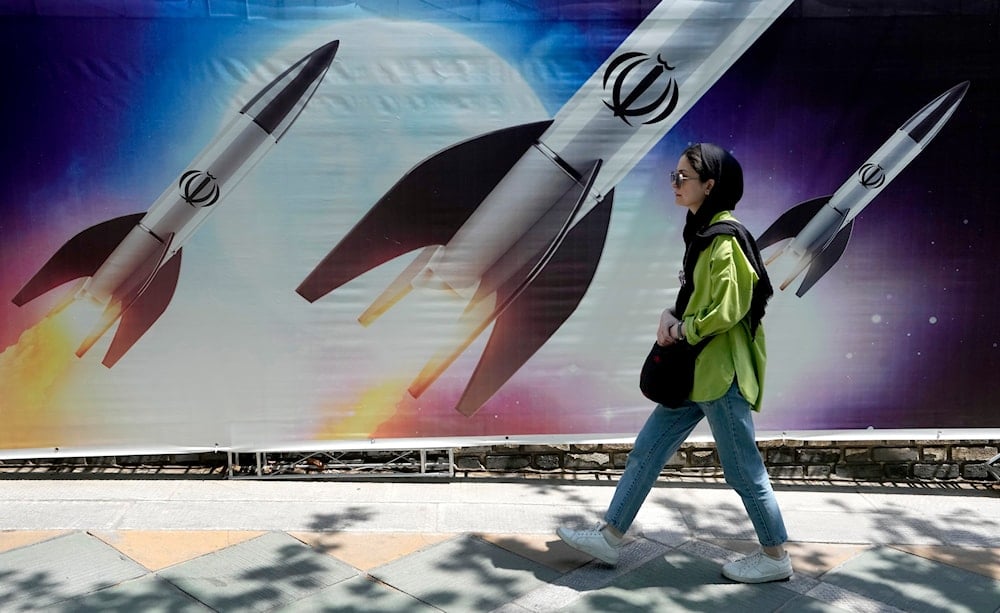Sanctions bolstered Iran military capabilities, general says
Iran's influence is growing despite sanctions, which did not stop its military from acquiring and developing sophisticated arms.
-

A woman walks past a banner showing missiles being launched, in northern Tehran, Iran, April 19, 2024 (AP)
The decades of sanctions imposed on Iran have, paradoxically, strengthened the country's military systems, said Wednesday Brigadier General Yousef Ghorbani, Deputy Coordinator of the Iranian Army’s Ground Force.
The sanctions on Iran have only served to enhance Iran's military prowess over the past 45 years.
He highlighted Iran's growing influence, noting that despite external threats and pressures, the nation's authority on the global stage was now unparalleled. He further asserted that Iran's continued resilience and strength have significantly undermined the dominance of what he described as "global arrogance."
General Ghorbani also referenced the recent Operation True Promise, a retaliatory strike by Iran in April against Israeli targets, claiming that the Israeli occupation's Iron Dome air defense missile system failed to intercept any of the missiles launched by Iran.
According to Israeli space engineering expert Moti Shefer, the Iron Dome was ineffective during the operation, which saw the Israeli regime fire 500 missiles in a failed attempt to intercept Iranian attacks. Shefer criticized the Iron Dome as a major deception, questioning the credibility of the Israeli military's claims.
General Ghorbani also mentioned the Lebanese Hezbollah Resistance Movement's missile strikes, which reportedly inflicted significant damage upon the Israeli occupation, further challenging its security capabilities.
He suggested that the Zionist regime has been unable to effectively respond to these ongoing regional threats.
The Washington Post reported that the Israeli occupation entity anticipates a potential retaliatory strike from Iran following the assassination of Hamas Political Bureau chief Ismail Haniyeh in Tehran, concerns are mounting over one of its key defense mechanisms - a US-led Arab coalition that played a pivotal role in countering the last Iranian attack.
The coalition, which included Jordan, Saudi Arabia, and the United Arab Emirates, became publicly known on April 13, when it assisted "Israel" in intercepting drones and missiles launched from Iran in response to the Israeli aggression on its consulate in Damascus.
At the time, "Israel’s" military chief praised the collaboration as opening "new opportunities for cooperation in the Middle East," while White House National Security Advisor John Kirby highlighted that it sent "a strong message about where Israel is in the region versus where Iran is in the region."
However, four months later, "Israel" finds itself more isolated in the region, a situation that military analysts warn could increase its vulnerability, The Washington Post pointed out, adding that even with US support, there are growing concerns that Israeli air defense systems may struggle to repel a massive, coordinated attack.
The report highlighted that in April, Arab countries played down their involvement in repelling the Iranian attack, cautious of Tehran's retaliation and reluctant to appear aligned with "Israel" amid widespread public anger over the Palestinian casualties in the Gaza Strip.
Now, Arab states are also seeking to distance themselves publicly from any future interference.
Jordan and Saudi Arabia have explicitly stated they do not want their airspace to become a battlefield, while Egypt has declared it will not participate in a military axis to repel an Iranian attack.

 3 Min Read
3 Min Read








